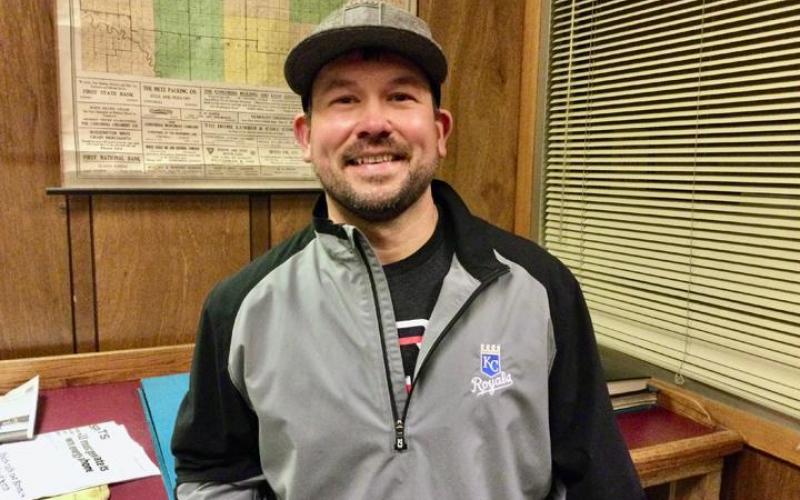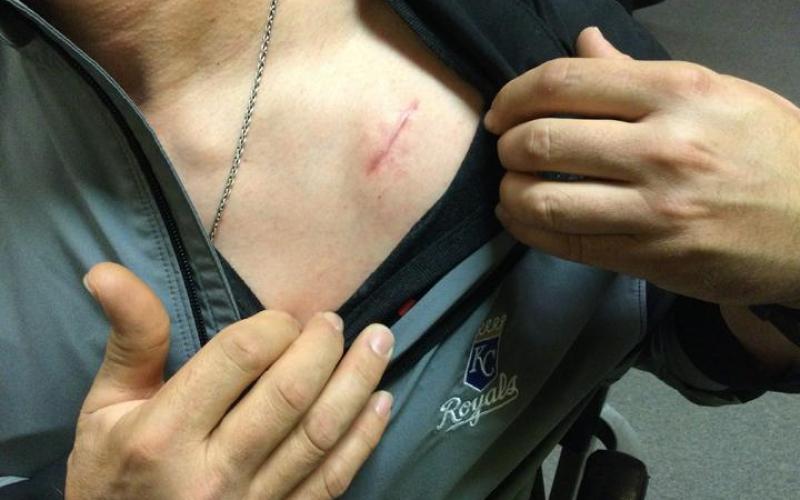Hood dies five times and lives to tell about it
GARRETT HOOD
Garrett Hood is lucky to be alive. Literally.
In the span of two hours, he died five times.
There is a blurred line between the actual definition of "death." But a flatlined electrocardiogram, where the heart shows no electrical activity, is the main factor of clinical death.
Garrett Hood's heart stopped beating five times.
"They caught two of them on the EKG at the hospital, and I did the same thing three times at home before I went to the hospital."
Hood is just 39 years of age and has no underlying health conditions. He has been dedicated to a fitness regime that keeps him in peak physical condition.
"The doctors have no idea what happened," he said. "For some reason my electrical system just decided to shut down."
Hood has gone where few have been and lived to tell about it. "I didn't see any bright lights," he said, and then added with a laugh, "or any flames, either, so I'm still not sure where I'm headed when it really is all over."
The frightening journey for Hood began on Monday, September 21. "I woke up about six in the morning and felt fine. But the night before, Sunday night, I had the most vivid dreams that I was in a hospital, in an Emergency Room. It was so real that I woke not really sure where I was. And then it started happening. I started passing out."
His girlfriend Stephanie Shuler remembers still being in bed when she heard a loud thump from the kitchen. "I didn't think anything about it. I thought he probably just tripped on something."
Hood said that he remembered feeding the dog, and then he woke up on the floor. By now Shuler was out of bed and knew right away that something was wrong. "He told me he thought he was going to pass out again, and then he did. His eyes rolled up in the back of his head, and there was this gurgling sound like all the air went out of his lungs, and then he went down. He wasn't breathing."
Hood woke and, despite Shuler's urging, refused to go to the hospital. "I'm stubborn that way. I haven't been to a doctor in 15 years. I thought if I just laid down on the couch for a while I'd feel better."
Shuler fretted as she drove to her job at the college. "I just knew it wasn't right, and I was at work maybe two minutes, and then I went back home. I thought maybe his blood sugar was low, so I tried to get him to eat an apple. And then it happened again. He just passed out."
Shuler got Hood in her car and raced to the Cloud County Health Center.
"We get there, and of course you know everybody," Hood said. "I'm feeling fine. They're asking me questions, and everybody is calm and I'm kind of joking about it. And then suddenly it felt like all the blood was rushing out of my head. I woke up in the ER, and I could tell by the looks on everybody's faces that I was in trouble."
'Clinical death' has varied definitions, but doctors consider the absence of any electrical activity in the heart a primary factor.
Hood's heart had stopped beating five times. At the hospital, it stopped for 28 seconds.
"They didn't shock me with the paddles or massage my heart back,"he said. "For some reason it just started beating again on its own."
The doctors would eventually diagnose Sick Sinus Syndrome, defined as the inability of the heart's natural pacemaker (sinus node) to create a heart rate that's appropriate for the body's needs. The result is irregular heart rhythms (arrhythmias) that can often be fatal.
"They told me it's something that could be hereditary," Hood said, "and that I might have been having these episodes before, maybe even in my sleep, but I just didn't notice."
The emergency staff at CCHC attached an external pacemaker to Hood's chest to regulate his heartbeat. He was then loaded into an ambulance for a fast trip to the Salina Regional Health Center.
"That pacer was shocking the hell out of me," Hood recalled. "I asked the paramedics if they were trying to fry bacon on my chest."
At the hospital in Salina, Hood was quickly stabilized and placed in ICU. "After that, my memory is a little foggy. They pumped a lot of drugs into me. I know they did a bunch of tests. And then this doctor put his hand on my shoulder and said they needed to put a pacemaker in me."
Thirty-nine years old, in peak physical condition, Garrett Hood now needed a man-made machine to stay alive. "I'm not going to lie to you, that hit me really hard. The emotional pain was worse than anything else. At first I didn't want them to do it. I just felt that it would change me more than I was willing to accept."
For Shuler, that was the most difficult moment of the entire ordeal. "There was no question that it had to be done, but he didn't want to. He didn't remember that he kept dying."
"It was all overwhelming," Hood agreed. "I just couldn't accept the fact that I had died."
Less than a day later, Hood was in surgery having a pacemaker attached to his heart. "I was awake the whole time. I could feel him make the cut; I could feel them attaching the leads to my heart. I think the procedure took about two hours, and I was talking to them the whole time."
Every year, over 200,000 Americans have a pacemaker procedure. Worldwide, it is estimated that one million people have the procedure done. The average age of an individual who has a pacemaker procedure is 75.
Hood was discharged from the hospital the day after his surgery. "There are no real restrictions," he said. "The leads needed time to seal, so I had to be careful moving my left arm over my head, things like that. I don't stand next to a microwave, and I avoid really large magnets. But other than, I'm good to go."
Now that Hood has had time to reflect back on the ordeal, he has a greater appreciation for each moment of life. "It definitely does change your perspective. For myself, there's still some of that emotional struggle. Every time I look in the mirror and I see the scar, I know I'm not the same person I used to be. Something like this makes you question a lot of things. The 'why' question is always in the back of your head. Why am I still here?"
Hood wanted to express his gratitude and heartfelt thanks to the CCHC staff, Concordia EMS, and the Salina Regional Health Center staff.
"When you're 39, you never think about your heart giving out," he said. "I know that I'm going to try and do the best I can from here on out, and figure out why He kept me here."



